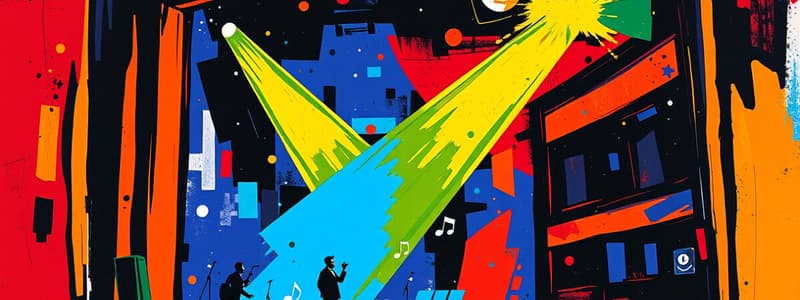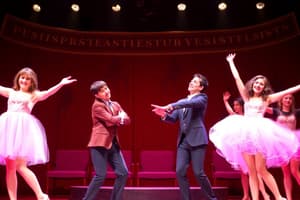Podcast
Questions and Answers
What defines a long run show in musical theater?
What defines a long run show in musical theater?
- Shows that have run for more than 5 years (correct)
- Shows that feature the same cast for its entire duration
- Shows that have been running for over 3 years
- Shows that are still in rehearsal for more than a year
What is a key responsibility of a stage manager for a long run show?
What is a key responsibility of a stage manager for a long run show?
- To direct the show every evening
- To oversee the replacement actors' integration (correct)
- To write new music for the show
- To create the entire piece from scratch
Which of the following roles is typically NOT involved in the rehearsal process for replacement actors?
Which of the following roles is typically NOT involved in the rehearsal process for replacement actors?
- Resident critics (correct)
- Stage manager
- Musical director
- Dance captains
When replacing in a long run show, what is the initial focus of rehearsals for the new actor?
When replacing in a long run show, what is the initial focus of rehearsals for the new actor?
What is a common misconception among replacement actors in long run shows?
What is a common misconception among replacement actors in long run shows?
Which aspect of the show is a stage manager NOT typically responsible for during a long run?
Which aspect of the show is a stage manager NOT typically responsible for during a long run?
In the context of a long run show, what does 'working within the confines of what has been established' imply for a replacement actor?
In the context of a long run show, what does 'working within the confines of what has been established' imply for a replacement actor?
What is typically included in the first steps of the rehearsal process for a replacement actor?
What is typically included in the first steps of the rehearsal process for a replacement actor?
What type of rehearsal primarily involves only new actors in costume?
What type of rehearsal primarily involves only new actors in costume?
What is typically missing from the first performance for new actors if it is a musical?
What is typically missing from the first performance for new actors if it is a musical?
How long can the rehearsal process for new actors take?
How long can the rehearsal process for new actors take?
What is one of the main responsibilities of the stage manager during this process?
What is one of the main responsibilities of the stage manager during this process?
What must ensemble members learn in addition to their main roles?
What must ensemble members learn in addition to their main roles?
What is a significant challenge for performers in a long run show?
What is a significant challenge for performers in a long run show?
What aspect of live theater influences each performance significantly?
What aspect of live theater influences each performance significantly?
What common activity do cast members engage in before each performance?
What common activity do cast members engage in before each performance?
What is the primary role of a stage manager in terms of perspective?
What is the primary role of a stage manager in terms of perspective?
According to the described approach, how should stage managers handle conflicts during a performance?
According to the described approach, how should stage managers handle conflicts during a performance?
What does the 'duck analogy' emphasize for stage managers?
What does the 'duck analogy' emphasize for stage managers?
How important is collaboration for stage managers according to the content?
How important is collaboration for stage managers according to the content?
What should stage managers avoid doing when making knee-jerk decisions?
What should stage managers avoid doing when making knee-jerk decisions?
What can help stage managers see situations from all angles?
What can help stage managers see situations from all angles?
How can a stage manager improve their decision-making over time?
How can a stage manager improve their decision-making over time?
What is a characteristic of a good leader in the context of stage management?
What is a characteristic of a good leader in the context of stage management?
What should always be the primary concern when making decisions related to a show?
What should always be the primary concern when making decisions related to a show?
When is a 'knee jerk decision' typically necessary during a show?
When is a 'knee jerk decision' typically necessary during a show?
What factor can lead to potential safety issues during a show?
What factor can lead to potential safety issues during a show?
What must you do if an injury occurs during a performance?
What must you do if an injury occurs during a performance?
How should decisions be made concerning underperformance or absences of cast members?
How should decisions be made concerning underperformance or absences of cast members?
What is one of the primary responsibilities when running day to day operations of a show?
What is one of the primary responsibilities when running day to day operations of a show?
Why is it crucial to be alert and use knowledge during a show?
Why is it crucial to be alert and use knowledge during a show?
What is a common challenge faced during the running of a show that can lead to errors?
What is a common challenge faced during the running of a show that can lead to errors?
What does standard practice involve when blocking a performance?
What does standard practice involve when blocking a performance?
Why is the role of the SM and dance captains important during rehearsals?
Why is the role of the SM and dance captains important during rehearsals?
What is a put-in rehearsal?
What is a put-in rehearsal?
What are quick change rehearsals discussed for?
What are quick change rehearsals discussed for?
What is the main purpose of understudy rehearsals?
What is the main purpose of understudy rehearsals?
What typically happens a few days before opening night?
What typically happens a few days before opening night?
What is likely to happen during costume and hair wig fittings?
What is likely to happen during costume and hair wig fittings?
What can complicate the rehearsal process for newcomers?
What can complicate the rehearsal process for newcomers?
Flashcards
Long-run shows
Long-run shows
Productions lasting over 5 years, featuring iconic musicals.
Stage manager role
Stage manager role
Oversees daily show operations, crucial for long-running shows.
Replacement actors
Replacement actors
Actors who step in for principal roles, needing thorough rehearsals.
Rehearsal process
Rehearsal process
Signup and view all the flashcards
Staging for replacements
Staging for replacements
Signup and view all the flashcards
Technical rehearsals
Technical rehearsals
Signup and view all the flashcards
Understudy rehearsals
Understudy rehearsals
Signup and view all the flashcards
Challenges in long-run shows
Challenges in long-run shows
Signup and view all the flashcards
Stage management priorities
Stage management priorities
Signup and view all the flashcards
Quick decision-making
Quick decision-making
Signup and view all the flashcards
Artistic expression
Artistic expression
Signup and view all the flashcards
Open communication
Open communication
Signup and view all the flashcards
Emotional detachment
Emotional detachment
Signup and view all the flashcards
The "duck" analogy
The "duck" analogy
Signup and view all the flashcards
Big-picture thinking
Big-picture thinking
Signup and view all the flashcards
Continuous evaluation
Continuous evaluation
Signup and view all the flashcards
Musical Director
Musical Director
Signup and view all the flashcards
Dance Captain
Dance Captain
Signup and view all the flashcards
Blocking system
Blocking system
Signup and view all the flashcards
Automation Tracks
Automation Tracks
Signup and view all the flashcards
Set pieces
Set pieces
Signup and view all the flashcards
Costume fittings
Costume fittings
Signup and view all the flashcards
Makeup fittings
Makeup fittings
Signup and view all the flashcards
Absenteeism
Absenteeism
Signup and view all the flashcards
Emergency Handling
Emergency Handling
Signup and view all the flashcards
Study Notes
Long-Running Shows
- Long-run shows refer to productions lasting over 5 years, including iconic musicals like Les Mis, Phantom, Chicago, Lion King, Jersey Boys, Mamma Mia, and Wicked.
- Phantom of the Opera notably holds a record of over 25 years of continuous performances.
Role of the Stage Manager
- Stage managers oversee the daily operations of a show, particularly significant in long-running productions due to frequent actor replacements.
- Replacement actors require thorough rehearsals to integrate into the established production seamlessly.
- The primary goal is to maintain the quality and freshness of the performance similar to opening night.
Rehearsal Process for Replacement Actors
- Rehearsals often involve learning music first, followed by character ideas and staging with creative team members, including musical directors and dance captains.
- Unlike educational theater, the rehearsal process for long-running shows is structured, focusing on integrating into a pre-existing framework rather than collaboratively creating a piece.
Learning and Technical Aspects
- Replacement actors learn staging through a blocking system based on a number line along the stage.
- Important landmarks for staging, like automation tracks and set pieces, help guide movement on stage.
- Costume and makeup fittings are scheduled alongside rehearsals to prepare for the production.
Technical and Understudy Rehearsals
- Technical rehearsals incorporate all special effects relevant to the production, including flying scenes and quick changes.
- Understudy rehearsals occur regularly to ensure backups are prepared for principal roles when needed.
Challenges of Performance
- Actors must keep performances fresh despite repeated shows, often needing to adapt to audience reactions.
- Daily operations face challenges like absenteeism due to sickness, vacation, or injuries, requiring quick decision-making by the stage management team.
Decision-Making and Safety
- Stage managers must prioritize the well-being of the cast and crew, handling emergencies efficiently while ensuring everyone’s safety.
- Quick decisions may be necessary during performances, demanding attentiveness to evolving situations, like technical failures or health emergencies.
Balance Between Structure and Creativity
- Replacement actors must find ways to express their artistic identity within the established direction of the show.
- Good leadership relies on open communication and collaboration within the production team to address and resolve conflicts holistically.
Emotional Management and Conflict Resolution
- Stage managers learn to detach from personal emotions to maintain professionalism, viewing conflicts as part of their role rather than personal attacks.
- The "duck analogy" emphasizes resilience and the ability to let difficulties roll off without internalizing them.
Big Picture Thinking
- Understanding how various components of a production fit together is crucial for stage managers to prioritize tasks effectively.
- Continuous evaluation of situations from multiple perspectives fosters better decision-making and strengthens teamwork within the production environment.
Studying That Suits You
Use AI to generate personalized quizzes and flashcards to suit your learning preferences.




